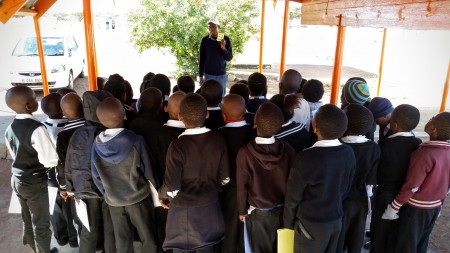
Children attend a school eye health screening in Botswana
Credit: Peek Vision
Peek Vision and the International Centre for Eye Health (ICEH) have been awarded a major new research grant to develop a tool to improve school eye health programme planning.
The funding from USAID will enable the development of a new School Eye Health Rapid Assessment (SEHRA). The aim is to help eye health providers gather the different information required to plan a school eye health programme, such as the prevalence of vision impairment in school-age children, human resource capacity, or supply chain details.
Worldwide, the number of children that have a vision impairment is unknown, partly because there are few agreed global standardised methods for gathering population-level data on school eye health.
However, it is estimated that at least 2.2 billion people worldwide have vision impairment or blindness. Vision problems in childhood can have a lifelong impact if left untreated, so recent decades have seen many eye health providers establish school eye health programmes to find and treat children who need eye care.
According to the project lead Dr Priya Morjaria, Head of Global Programme Design at Peek Vision and Assistant Professor at the International Centre for Eye Health, “Ultimately we want more children to be able to access quality vision-saving eye care services. Our hope is that SEHRA can help with this by solving a problem for both eye health providers and funders.”
“Firstly, we want SEHRA to help eye health providers implement school eye health programmes that are evidence-based, meet the unmet eye health needs of children and make appropriate use of the capacity available. Secondly, we think SEHRA will also help eye health funders assess where they should invest money, so that funding is being received where it is most needed.”
“In the past few years, Peek Vision has developed evidence-based tools that are being used by our partners to identify the barriers to screening, coverage, referral adherence and treatment effectiveness,” adds Dr Andrew Bastawrous, Peek Vision CEO and also Associate Professor at the International Centre for Eye Health.
“We now have a much better understanding of what the barriers are, but it is evident that these are very context specific. To meet children’s eye health needs and deliver more effective programmes, we need a baseline understanding of need and a systematic analysis of patient, service and policy barriers – and that is exactly what we hope SEHRA will provide.”
The project builds on the long-standing collaboration between Peek and ICEH to digitise and upgrade the globally-recognised Rapid Assessment of Avoidable Blindness (RAAB) methodology. The development phase is expected to run for two years and is being supported by an advisory committee of individuals from leading eye health organisations.
Once the initial desk-based development work is complete, the team expects to work with partners in established eye health programmes to test and develop the tool in preparation for wider use.
To keep up-to-date on the latest news about SEHRA, sign up to receive the Peek newsletter or follow us on social media.